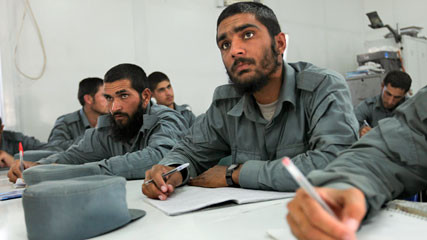AOL News, December 16, 2010
Illiteracy Breeds Corruption, Slows Training Among Afghan Recruits
Most recruits don't know what a number is, let alone how to count, Ferrari says, which makes tracking serial numbers on weapons and other equipment impossible
By Sharon Weinberger
Rampant illiteracy among Afghanistan's army and police recruits is fueling corruption and slowing training, according to a U.S. Army official working with the nascent security forces.

Khan Agha, an Afghan police recruit, center, attends a literary class onn the outskirts of Kabul, Afghanistan. A U.S. Army official says only 15 percent of Afghan police and military recruits can read and write. (Photo: Altaf Qadri/AP)
"Estimates range, but we think right now when we're recruiting that only 15 percent of the soldiers and policemen that we recruit are literate," Col. John Ferrari, the deputy commander for program at NATO Training Mission Afghanistan, told reporters in a conference call. "And when I say literate, that means they can function at maybe a first- or a third-grade level."
A 15 percent literacy rate is low even by Afghan standards. The literacy rate among the general population is estimated to be around 28 percent.
Most recruits don't know what a number is, let alone how to count, Ferrari says, which makes tracking serial numbers on weapons and other equipment impossible.
"If you have 10 radios and you don't know what the number 10 means, how do you keep accountability of the radios?" he said.
Illiteracy makes it difficult to train new recruits, and it also fuels corruption, according to Ferrari, who says police who can't read or write are being taken advantage of by unscrupulous supervisors stealing their pay.
"If you only get half your paycheck and you can't support your family, what you wind up doing, then, is shaking down and setting up illegal checkpoints or doing things you shouldn't be doing," he said.
Despite longstanding problems with literacy, the U.S. and NATO have only recently begun focusing on improving recruits' reading and writing skills.
"We have not been at this for a while on the literacy front," Ferrari said. "One would say, hey, you know, we've been training the Afghan army and police for nine years, and that's true, but there was never a concerted effort to tackle the literacy challenge."
Ferrari credited Richard Holbrooke, the U.S. special envoy for Afghanistan and Pakistan who died Monday, for instituting literacy programs for the police and security forces.
"It was his belief -- correctly, as it turns out -- that a large part of [corruption] was due to the fact that the police were illiterate," Ferrari said.
By mid-2011, Ferrari says he expects there to be about 100,000 personnel from the police and security forces enrolled in the new literacy program.
"We haven't seen on a large scale the transformative effects of the literacy training yet, because we're just getting started," he said.
Characters Count: 3333
